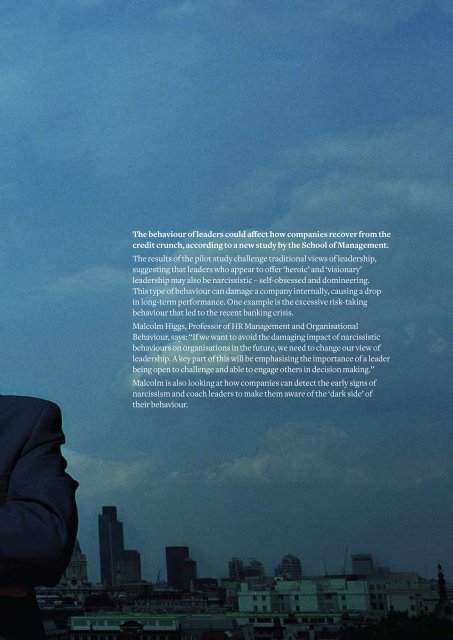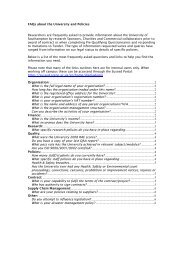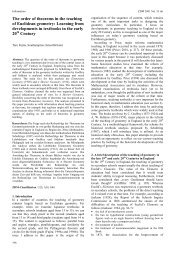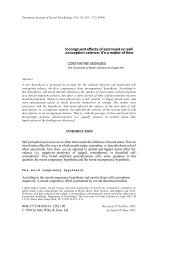- Page 1 and 2: Challenging minds. Undergraduate pr
- Page 3: 5 1. Outstanding academics Men and
- Page 7: Protecting against infection. Resea
- Page 12 and 13: Outstanding academics 1. Dr Faith H
- Page 14 and 15: Entrepreneurial edge The University
- Page 17 and 18: Research centres With an unparallel
- Page 19 and 20: Our flagship Centre for Maritime Ar
- Page 21 and 22: Undergraduate teaching at the Unive
- Page 23 and 24: Seven members of Thunderer Squadron
- Page 25 and 26: 1 2 3 4
- Page 27 and 28: See for yourself: University open d
- Page 29 and 30: Installation in the exhibition spac
- Page 32 and 33: Libraries “Ranked sixth in the Ru
- Page 34 and 35: Southampton & region Southampton is
- Page 36 and 37: With 20 halls of residence, first-c
- Page 38 and 39: Further information and costs Wesse
- Page 40 and 41: We are fully aware of the needs of
- Page 42 and 43: Here you will find the latest infor
- Page 44 and 45: We have more than £4m for scholars
- Page 46 and 47: Our aim is to select students who w
- Page 48 and 49: The journey to your degree 48 How t
- Page 50 and 51: From the moment you arrive, we will
- Page 52 and 53: Directory of services 52 First Supp
- Page 54 and 55: The School of Management has an int
- Page 56 and 57: Dolphins, jet engines, concert and
- Page 58 and 59: The sky is not the limit, it is jus
- Page 60 and 61:
Anthropology provides a crosscultur
- Page 62 and 63:
Study criminology, anthropology and
- Page 64 and 65:
A degree in archaeology will open u
- Page 66 and 67:
Audiology is the healthcare science
- Page 68 and 69:
Biochemistry, the molecular approac
- Page 70 and 71:
Biology is a diverse discipline, wi
- Page 72 and 73:
Biomedical science is the study of
- Page 74 and 75:
Chemistry influences many different
- Page 76 and 77:
Civil engineering applies science,
- Page 78 and 79:
Computer science is at the foundati
- Page 80 and 81:
Have you ever wondered what causes
- Page 82 and 83:
Explore the development of psycholo
- Page 84 and 85:
We all take economic decisions ever
- Page 86 and 87:
“Economics seemed like an ideal c
- Page 88 and 89:
The BA Education and Training (PCET
- Page 90 and 91:
If you are a graduate working as a
- Page 92 and 93:
Electrical engineering concerns any
- Page 94 and 95:
Electromechanical engineering is co
- Page 96 and 97:
Electronics and electronic systems
- Page 98 and 99:
Southampton is the UK’s leading u
- Page 100 and 101:
The Foundation Year is the first ye
- Page 102 and 103:
English can be a particularly satis
- Page 104 and 105:
Creativity and innovation are key t
- Page 106 and 107:
With a growing global population, t
- Page 108 and 109:
Environmental scientists are the pr
- Page 110 and 111:
Our Fashion and Textile Design prog
- Page 112 and 113:
The pervasiveness of modern communi
- Page 114 and 115:
Film studies is an exciting and cha
- Page 116 and 117:
Our Fine Art programme offers innov
- Page 118 and 119:
French is a key international langu
- Page 120 and 121:
Geography is an exciting discipline
- Page 122 and 123:
Your planet needs you. Study geolog
- Page 124 and 125:
Geophysics is a broad subject, expl
- Page 126 and 127:
Spoken by over 120 million people a
- Page 128 and 129:
Our Graphic Arts programme recognis
- Page 130 and 131:
Health and social care offers excit
- Page 132 and 133:
History explores a rich array of pa
- Page 134 and 135:
In a world where e-commerce, mobile
- Page 136 and 137:
The International Foundation Year p
- Page 138 and 139:
How has the law responded to the di
- Page 140 and 141:
We offer a range of programmes that
- Page 142 and 143:
Management is concerned with planni
- Page 144 and 145:
Management scientists apply a ratio
- Page 146 and 147:
Marine biology embraces the study o
- Page 148 and 149:
Mathematicians develop important an
- Page 150 and 151:
Making it all add up New mathematic
- Page 152 and 153:
Mechanical engineering encompasses
- Page 154 and 155:
The School of Medicine at Southampt
- Page 156 and 157:
Pregnancy and birth are major event
- Page 158 and 159:
Southampton has one of the largest
- Page 160 and 161:
Science is becoming increasingly mu
- Page 162 and 163:
We offer a range of exciting, chall
- Page 164 and 165:
Occupational therapy is an exciting
- Page 166 and 167:
Oceanography is the science of expl
- Page 168 and 169:
Recent advances in pharmacology - t
- Page 170 and 171:
“The great virtue of philosophy i
- Page 172 and 173:
The School of Physics and Astronomy
- Page 174 and 175:
At the heart of this science-based
- Page 176 and 177:
This programme will challenge you a
- Page 178 and 179:
National decisions can have interna
- Page 180 and 181:
“The hungry world cannot be fed u
- Page 182 and 183:
Psychology is the scientific study
- Page 184 and 185:
Southampton is one of the UK’s le
- Page 186 and 187:
The Foundation Year is the first ye
- Page 188 and 189:
Ship science studies the engineerin
- Page 190 and 191:
Social work is all about people. If
- Page 192 and 193:
How should we deal with educational
- Page 194 and 195:
At Southampton you can develop your
- Page 196 and 197:
Sport plays a significant role in c
- Page 198 and 199:
The FdA Working With Children is de
- Page 200 and 201:
The BA (Hons) Working with Young Pe
- Page 202 and 203:
Zoology is the study of animals −
- Page 204 and 205:
How to get here By road Southampton
- Page 206 and 207:
A B E Index Accommodation 36 Accoun
- Page 208:
prospenq@southampton.ac.uk global@s
















